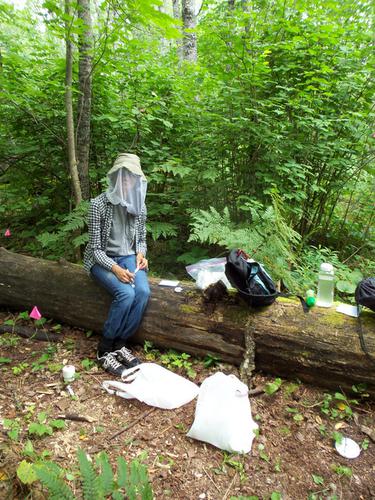当前位置:
X-MOL 学术
›
Funct. Ecol.
›
论文详情
Our official English website, www.x-mol.net, welcomes your
feedback! (Note: you will need to create a separate account there.)
Plant roots stimulate the decomposition of complex, but not simple, soil carbon
Functional Ecology ( IF 4.6 ) Pub Date : 2020-01-14 , DOI: 10.1111/1365-2435.13510 Jessica A. M. Moore 1 , Benjamin N. Sulman 2 , Melanie A. Mayes 2 , Courtney M. Patterson 1 , Aimée T. Classen 3
中文翻译:

植物根系刺激复杂但不简单的土壤碳的分解
更新日期:2020-01-14
Functional Ecology ( IF 4.6 ) Pub Date : 2020-01-14 , DOI: 10.1111/1365-2435.13510 Jessica A. M. Moore 1 , Benjamin N. Sulman 2 , Melanie A. Mayes 2 , Courtney M. Patterson 1 , Aimée T. Classen 3
Affiliation

|
- Roots release carbon into soil and can alleviate energy limitation of microbial organic matter decomposition. We know little about the effects of roots on microbial decomposition of different organic matter substrates, despite the importance for soil carbon stocks and turnover. Through implementing root–microbe interactions, the Carbon, Organisms, Rhizosphere and Protection in the Soil Environment (CORPSE) model was previously shown to represent dynamics of total soil carbon in temperate forest field experiments. However, the model permits alternative hypotheses concerning microbial‐substrate affinity.
- We investigated how root inputs affect decomposition of soil organic carbon (SOC) with variable decomposability. We simulated SOC stocks in CORPSE and compared microbial degradation of two substrate types with varying root–microbe interactions under two alternative hypotheses that varied in microbial‐substrate affinity. We compared our modelled hypotheses to a forest field experiment where we quantified decomposition of isotopically labelled starch and leaf tissues in soils with manipulated root access to microbes. We tested the hypothesis that decomposition of leaves would be more sensitive to root inputs than decomposition of starch, corresponding to the alternative model hypotheses.
- In the field study, leaf decomposition increased with root density, whereas starch decomposition was unchanged by root density. Microbial biomass and enzyme activity consistently increased with root inputs in CORPSE and the field study. Our field experiment supported the CORPSE simulations with high microbial‐substrate affinity.
- Roots stimulated microbial growth and enzyme production, which increased the degradation of more complex substrates such as leaf tissues. Substrates that were easily decomposed, such as starch, may already be degrading at a maximum rate in the absence of rhizosphere influence because their decomposition rate was unchanged by root inputs. We found that the degree to which roots stimulate microbial decomposition depends on the substrate being decomposed, and that root–microbe interactions influenced SOC stocks in both our model and field experiment. Environmental changes that alter root–microbe interactions could, therefore, alter soil C stocks and biogeochemical cycling, and models of these interactions should incorporate differential influence of rhizosphere inputs on different substrates.
中文翻译:

植物根系刺激复杂但不简单的土壤碳的分解
- 根将碳释放到土壤中,可以减轻微生物有机物分解的能量限制。尽管对土壤碳储量和周转率很重要,但我们对根对不同有机物质基质的微生物分解的影响知之甚少。通过实现根与微生物的相互作用,先前显示了碳,生物,根际和土壤环境保护(CORPSE)模型代表了温带森林田间试验中土壤总碳的动态。但是,该模型允许有关微生物-底物亲和力的其他假设。
- 我们调查了根源输入如何以可变的可分解性影响土壤有机碳(SOC)的分解。我们模拟了CORPSE中的SOC存量,并根据微生物-底物亲和力不同的两个替代假设,比较了具有不同根-微生物相互作用的两种底物类型的微生物降解。我们将模拟的假设与森林田间实验进行了比较,在森林实验中,我们通过对微生物的根接触进行了控制,定量了同位素标记的淀粉和土壤中的叶组织的分解。我们测试了这样的假设:与替代模型假设相对应,叶子的分解对根输入的敏感性比淀粉的分解更为敏感。
- 在田间研究中,叶片分解随根系密度增加而增加,而淀粉分解随根系密度不变。微生物的生物量和酶活性随着根系输入的增加而持续增加。我们的现场实验以较高的微生物底物亲和力支持了CASSE模拟。
- 根刺激了微生物的生长和酶的产生,从而增加了诸如叶片组织等更复杂的底物的降解。在没有根际影响的情况下,容易分解的底物(例如淀粉)可能已经以最大速率降解,因为根部投入不会改变其分解速度。我们发现,根部刺激微生物分解的程度取决于被分解的底物,并且在我们的模型和现场实验中,根部与微生物之间的相互作用都会影响SOC储量。因此,改变根与微生物相互作用的环境变化可能会改变土壤碳储量和生物地球化学循环,这些相互作用的模型应考虑到根际输入对不同基质的不同影响。











































 京公网安备 11010802027423号
京公网安备 11010802027423号